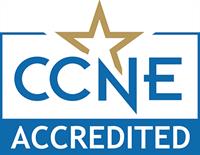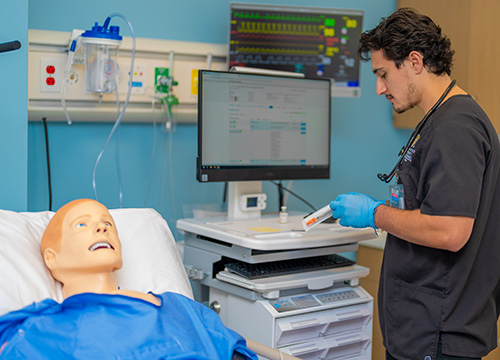St. Bonaventure University partners with the Cattaraugus County Campus of Jamestown Community College in a blended campus program in which students earn an Associate of Applied Science in Nursing from JCC and a Bachelor of Science in Nursing from St. Bonaventure.

The baccalaureate degree program in Nursing at St. Bonaventure University is accredited by the Commission on Collegiate Nursing Education (
http://www.ccneaccreditation.org).
Officially recognized by the U.S. Secretary of Education as a national accreditation agency, the Commission on Collegiate Nursing Education (CCNE) is an autonomous accrediting agency, contributing to the improvement of the public's health. CCNE ensures the quality and integrity of baccalaureate, graduate, and residency programs in nursing.
Celebrating Exam Success
All six students in the second cohort of the Dual Degree in Nursing program have passed the National Council Licensure Examination for Registered Nurses.
Read the full story!
Two degrees, two programs committed to excellence

This unique dual degree opportunity blends the expert faculty and facilities of two accredited* Nursing programs, enabling students to obtain their registered nurse license and complete their B.S. in Nursing in four years.
Students apply for admission to St. Bonaventure and live on the SBU campus. They take classes at SBU and at JCC's Cattaraugus County Campus, located in the heart of downtown Olean.
All but two classes freshman year are taken at St. Bonaventure. In years two and three, all classes except one each semester are taken at JCC. Senior year, all classes are at St. Bonaventure.
Studies in the first, second and third year of the program prepare students to take the National Council Licensure Examination (NCLEX-RN) while taking liberal arts and sciences through a blended-campus approach.
Upon finishing their third year, students earn an Associate of Applied Science in Nursing degree from JCC and can take the NCLEX-RN to become registered nurses, allowing them to begin entry-level practice.
Since the last year of the program is presented in a hybrid format, students have the freedom to begin working as registered nurses if they choose to gain experience while finishing their bachelor’s degrees at St. Bonaventure.
The SBU/JCC Dual Degree Nursing program enables graduates to satisfy the New York state requirement that nurses who graduate from associate degree or diploma nursing programs obtain a bachelor's degree in Nursing within 10 years of initial licensure.
Facilities & resources

St. Bonaventure's Nursing programs are part of the university's Dennis R. DePerro School of Health Professions, which is housed in Francis Hall, where $18 million in renovations in 2020-21 transformed one of the grandest buildings on campus into a state-of-the-art health care education center.
Facilities include a physical diagnosis lab with 3,000 square feet of floor space that includes:
- three exam rooms
- inpatient stations with hospital beds and real working nursing equipment, such as Alaris IV pumps, MedRX medication carts for simulation, and manikins for every bed
- outpatient learning stations with clinic exam tables and divider curtains
There are also student breakout rooms throughout the building, a locker room, as well as modern classrooms, meeting spaces, labs and faculty offices.
Jamestown Community College offers dedicated classrooms and labs for Dual Degree students, as well as teaching technology and student learning space. A dedicated nursing arts laboratory is also available that includes high- and low-fidelity simulation manikins, clinical supplies, and presentation technology equipment.
Application timeline for fall 2026
Applications will be considered until seats are filled.
If an applicant is offered a seat in the program, they must accept or decline the seat by May 1, 2026 – the national enrollment deadline.
Admission requirements and procedures
Prospective students
apply for admission to St. Bonaventure, indicating Dual Degree Nursing as their major.
This program has
30 available seats for fall 2026 and applications are considered on a rolling basis until seats are filled. Qualified applicants who have been admitted are encouraged to reserve a seat by submitting an acceptance form to the nursing department
AND depositing on the admitted students page. *Please note, a deposit fee is refundable until
May 1, 2026.
The minimum GPA is 85%. Successful completion of high school or college level chemistry is also required. A strong science-based academic background is highly recommended.
Students must meet certain benchmarks to advance through the program. They will have a faculty adviser to help them meet the program benchmarks and guide them through the process of meeting requirements of the AAS program at JCC.
Students in the program are responsible for their own transportation to and from the two campuses.
*Jamestown Community College and St. Bonaventure University are accredited by the Middle States Commission on Higher Education.
JCC's Associate of Applied Science in Nursing program is accredited by the
Accreditation Commission for Education in Nursing, Inc.
St. Bonaventure’s nursing programs are accredited by the
Commission on Collegiate Nursing Education (CCNE).